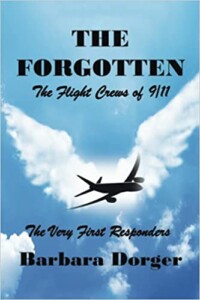Title: The Forgotten: The Flight Crews of 9/11 (The Very First Responders)
Author: Barbara Dorger
Publisher: XlibrisUS
ISBN: 978-1-6641-8331-5
Pages: 228
Genre: History/Memoir
Reviewed by: Jason Lulos
Pacific Book Review
Perhaps everyone knows where they were on 9/11; a singularly tragic event in modern American history. Such a catastrophe left us all bereft and, in the aftermath, with many enduring questions. Why did it happen? How could our superior security have let this happen? And what steps would be taken to ensure it never happens again? In The Forgotten: The Flight Crews of 9/11 (The Very First Responders), author Barbara Dorger gives the reader an illuminating and unique perspective on the events, having been a flight attendant at the time. Though focused on the perspective of aviation workers before, during, and following the attacks, this is a comprehensive and fascinating study with revealing insights leading to questions yet unanswered: a diligent tribute to the 33 flight crew members “Our 33” who lost their lives on 9/11.
On that fateful day, Dorger, still a flight attendant, was laid over in Hong Kong. Upon returning home, she and her coworkers are met with indifference which she dismissed as a product of an entire nation in shock. As the grieving transitioned into investigation, the hows, whys, and what ifs multiplied. That indifference continued, leading to layoffs and thousands forced into early retirement. Inasmuch as the author pursued this as a study of failures that led to 9/11, it is an illustration of the plight aviation workers faced in its aftermath.
In later chapters, the author provides brief but cogent histories of the FBI, CIA, the FAA, hijackings, airline security responses, and regulation/deregulation. In addition to the government-airline complex for context, Dorger relates accounts from fellow flight attendants, some of whom had actually served on flights containing eventual 9/11 hijackers, presumably gathering information for their destructive plot. Again, this underscores the notion that mechanisms were not in place for flight workers’ concerns to be heard. More vitally, it shows how little government counterintelligence and airline security were sharing with these front-line workers. With ample warnings during both the Clinton and Bush administrations, questions on this lack of communication persist.
While noting the obvious failures in preventing the attacks, this book also highlights the day’s heroics. The author praises how other countries expressed solidarity around the world and notably how helpful Canada was in accommodating passengers of rerouted flights when all were grounded. She wholeheartedly champions the flight crews’ brave and remarkably calm response, noting people like Betty Ong (American Airlines flight 11) whose prompt communications from her hijacked flight alerted those on the ground and possibly prevented other hijackings that very day.
The author demonstrates a remarkable grasp of the history of aviation and its relation to governmental bureaucracy. Nothing overtly conspiratorial here; simply still wondering about the whys, hows, and what ifs. The fallout in the aviation industry led to thousands laid off or forced into early retirement, pensions and salaries gutted, lawsuits merely settled, leaving victims’ families meagerly compensated with questions left unanswered.
This book is a compelling analysis of events surrounding 9/11, a tribute to “Our 33,” and a call to flight workers everywhere that their efforts before, during, and after 9/11 have not gone unnoticed. I highly recommend this for all Americans but particularly those interested in a different perspective and insight on the 9/11 attacks.



Follow Us